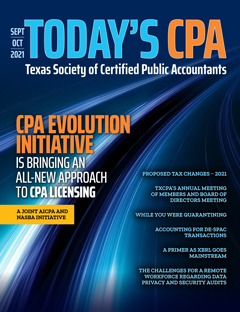Proposed Tax Changes – 2021
By Marvin J. Williams, MBA, JD, CPA, CMA, CFM, CGMA
As the pendulum changes in Washington, D.C., one inevitable that can always be anticipated are changes in the area of federal taxation. The most recent change in political parties is no different and as the new administration is still getting settled, proposals in changes to the federal tax laws are developing.
The purpose of this article is to highlight and discuss some of the more prominent proposals that are developing and anticipate or measure the impact of some of these proposals if they are enacted. There are proposals pending in both the House of Representatives and the Senate. The primary proposals are in three areas:
- Capital gains and related matters;
- Retirement planning; and
- Estate and gift taxation.
Capital Gains and Related Matters
Bernie Sanders’ 99.5% Act and President Joe Biden’s American Families Plan are now being discussed and include increasing taxation on high wage earners and the wealthy. One aspect that is often considered to benefit high income taxpayers is the preferential treatment of capital gains. The present capital gains tax rate (for long-term capital gains and qualified dividends) is 20% for taxpayers in the highest tax bracket, 15% for the next four tax brackets, and 0% for taxpayers in the two lowest tax brackets.
One pending proposal is to raise the capital gains tax to 39.6% for taxpayers with income in excess of $1,000,000 for taxpayers filing jointly and $500,000 for taxpayers filing separately. The proposed 39.6% top capital gains tax rate would match a separate proposal to raise the highest individual income tax rate from 37% to 39.6% (which was the highest individual income tax rate before it was changed to 37% in 2018).
In effect, this proposal completely eliminates the preferential capital gains tax rate for these taxpayers. Combined with the net investment income tax rate of 3.8%, the proposal increases the combined individual income tax rate and net investment income tax rate to 43.4%.
Another proposal related to capital gains is the immediate recognition of gains (and losses) on the transfer of property by death or gift. If this provision becomes law, it will be a dramatic change and have a significant impact on many taxpayers.
Under current law, a transfer of property by gift or death of the owner results in no immediate income taxation to the donee or donor of the property or deceased taxpayer. Currently, for transfers of property at death, the fair market value of the transferred property becomes the basis of the property in the hands of the heir. For property that had significantly increased in value, that unrealized gain is eliminated by the step-up in basis to the heir.
Under one proposal, this unrealized gain will become taxable immediately and the gain recognized in the year of death. Moreover, the basis of gift property (for the most part with some minor variations) carries over from the donor to the donee. No tax consequences (gain or loss) are recognized by either party until the donee disposes of the gifted property in a subsequent taxable event. One current proposal would create an immediate recognition of income/gain (or loss) to the donor at the time of the gift.
If the proposal becomes law, it will greatly impact how property may be transferred by owners at the time of their death or by gift. It would constitute a major departure from how property has been disposed and will require new tax planning strategies for the disposition of property. There are limited exceptions to these proposals, including excluding up to $1,000,000 of unrealized gains from tax.
Retirement Planning
Another area of federal taxation that is getting considerable attention is retirement income. For obvious reasons, this is an area that impacts many taxpayers who are presently receiving retirement distributions, as well as those not yet at retirement age but need to plan for future retirement distributions.
Certain proposals in the retirement planning/taxation area include expanding retirement savings and coverage for more taxpayers. A snapshot of some of these proposals include auto-enrollment in retirement plans, allowing for employer matching contributions to be designated as Roth contributions (as well as for Simplified Employee Pension Plans and Simple IRAs) and increasing the current three-year credit for Small Business Pension Plans start-up costs and extending the time period to five years.
In addition, increasing the age for mandatory retirement distributions, indexing to inflation the catch-up contribution limits and increasing these limits for higher age employees are being considered.
Estate and Gift Taxation
In the area of estate and gift taxation, there are proposals to reduce the lifetime exemption for transfers by gift or death. The exemption equivalent was significantly raised beginning January 1, 2018, and the inflation adjusted amount for the 2021 year is $11,700,000. The exemption equivalent that was increased beginning January 1, 2018, is scheduled to sunset to its previously inflation adjusted amount (approximately to $6,000,000) on January 1, 2026.
Current proposals seek to reduce the exemption equivalent for the gift tax exemption amount to $1,000,000 and the estate tax (and generation-skipping transfer tax) exemption amount to $3,500,000. Moreover, proposals recommend raising the current maximum transfer tax rate of 40% to 45%-65%. Limiting the annual gift tax exclusion amount (presently $15,000 per donee) is also being considered.
Other aspects in the estate and gift tax area include limiting marketability and minority interests and valuation discounts in appraising the value of property for family controlled businesses.
Impact on High Income Taxpayers
At this point, these proposals are simply that – proposals. As the Congressional debate intensifies, there will be considerable changes and, as usual, final outcome is impossible to project at this time. In addition, the effective dates of these proposals are yet to be determined and all may or may not be implemented at the same time. However, one point is quite clear: high income taxpayers will be affected by these changes.
About the Author: Marvin J. Williams, MBA, JD, CPA, CMA, CFM, CGMA, is Professor of Accounting and Taxation at the University of Houston – Downtown. Contact him at williamsm@uhd.edu.
Bibliography
1. Internal Revenue Code of 1986.
2. Raabe, William A., Young, James C., Nellen, Annette, Hoffman, William H. Corporations, Partnerships, Estates and Trusts. 2022 45th Annual Edition. South-Western Cengage Learning, 2021.
3. Grant Thornton: Mechanics Toolbox Series – Proposed Individual Tax Changes (June 29, 2021).
4. Fox Business News (March 31, 2021).



